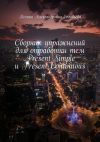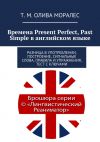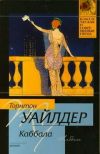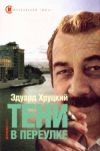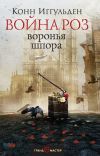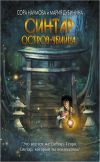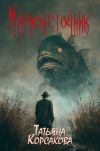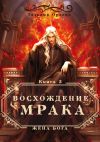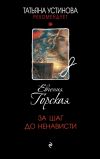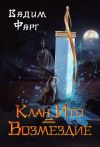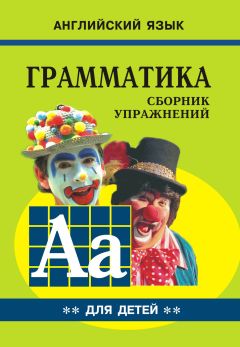
Автор книги: Марина Гацкевич
Жанр: Прочая образовательная литература, Наука и Образование
Возрастные ограничения: +6
сообщить о неприемлемом содержимом
Текущая страница: 2 (всего у книги 8 страниц) [доступный отрывок для чтения: 2 страниц]
64. Choose the correct item.
1. I … a cup of coffee ten minutes ago.
am drinking, drink, drank
2. We usually … bananas for lunch.
eat, ate, are eating
3. Kate and Mike … at the birthday party right now.
are dancing, danced, dance
4. My little sister … supper two hours ago.
is having, has, had
5. They … shopping the other day.
don’t go, aren’t going, didn’t go
65. Choose the correct item.
1. The sun … now.
is rising, rose, rises
2. My grandmother … education at home many years ago.
gets, got, is getting
3. James always … with the window open.
is sleeping, slept, sleeps
4. She … washing yesterday.
isn’t doing, didn’t do, doesn’t do
5. Mike often … in the garden helping his mother.
is working, works, worked
66. Choose the correct item.
1. He … to school by car now.
got, gets, is getting
2. The children … cartoons yesterday evening.
don’t watch, aren’t watching, didn’t watch
3. Julia always … in the sun at the seaside.
is lying, lies, lay
4. I … a novel by Mark Twain last year.
read, am reading, read [red]
5. It … last week.
doesn’t snow, isn’t snowing, didn’t snow
67. Choose the correct item.
1. My sister … in for skating last winter.
goes, went, is going
2. Jane … now.
paints, painted, is painting
3. She … on the computer last week.
doesn’t work, didn’t work, isn’t working
4. My mother always … the truth.
is telling, told, tells
5. He … from Greece twenty years ago.
came, comes, is coming
68. Open the brackets.
1. You (to go) to the cinema yesterday?
2. When she (to get up) yesterday morning?
3. Why Jill (not to go) to school last week?
4. With whom David (to play) football at the stadium the day before yesterday?
5. How much money you (to spend) yesterday?
6. Where they (to have dinner) yesterday afternoon?
7. How many lessons we (to have) yesterday?
8. Your sister (to watch) TV yesterday evening?
9. Where he (to live) last year?
69. Open the brackets.
1. What you (to do) yesterday evening?
2. When Ben (to come) home the day before yesterday?
3. You (to go) to the swimming pool yesterday?
4. Who (to cook) dinner for you last week? 5. What game they (to play) at the stadium yesterday?
6. How often your sister (to visit) her Granny last month?
7. What Mike (to have) for supper yesterday?
8. You (to take) your medicine yesterday evening?
9. When Bat (to go) to school yesterday morning?
70. Open the brackets.
1. You (to listen) to the radio yesterday morning?
2. They (to go) for a walk yesterday afternoon?
3. Why you (not to help) your Granny about the house yesterday?
4. What Tom and Billy (to have) for lunch yesterday?
5. You (to go) to the country last summer?
6. With whom your father (to play) chess yesterday evening?
7. Your friends (to go) to the circus last week?
8. Why Colin (not to go) shopping yesterday?
9. Jane (to send) a telegram yesterday?
71. Open the brackets.
1. Who (to cry) in the kitchen five minutes ago?
2. When you last (to talk) on the phone?
3. She (to write) a letter to her Granny last month?
4. How many times you (to go) to the theatre last year?
5. Why Jack (not to take) a shower yesterday morning?
6. Your dog (to bark) in the garden yesterday evening?
7. How much meat you (to buy) yesterday?
8. They (to drink) Coca Cola two hours ago?
9. Where they (to go) the day before yesterday?
72. Open the brackets.
1. Where Carol (to work) five years ago?
2. He (to sleep) on the sofa yesterday?
3. When Kate last (to sweep) the floor?
4. Who (to open) the window two hours ago?
5. What book she (to read) last month?
6. Which of your friends (to go) to London last year?
7. She (to water) the plants in the kitchen garden yesterday?
8. Why Fred (not to swim) in the pond yesterday morning?
9. With whom you (to go) to the disco club last week?
73. Open the brackets.
1. When Alice last (to put on) her new dress?
2. You (to buy) sweets yesterday?
3. When you (to come) home yesterday?
4. They (to help) their Granny about the house last week?
5. What your cat (to eat) yesterday?
6. How often you (to eat) bananas last summer?
7. Why he (not to study) hard last year?
8. Where Helen and Fred (to play) tennis last week?
9. How many books Liz (to read) last month?
74. Answer the questions using the words in brackets.
Example:
Why didn’t Sally do her homework yesterday? (to be ill)
Because Sally was ill yesterday.
1. Why didn’t you read an English book yesterday? (to learn the poems by heart)
2. What did Sue do the day before yesterday? (to go to the theatre)
3. Did it rain yesterday afternoon? (to snow)
4. What did Mike do in the hall five minutes ago? (to take off his shoes)
5. Why didn’t they go to the country last Saturday? (to rain)
6. Did your friend listen to the concert on the radio? (to watch TV)
7. Why didn’t George make a phone call yesterday evening? (to sleep)
8. What did you do near the monument an hour ago? (to take pictures)
9. Did your grandfather listen to the radio yesterday evening? (to talk with Granny)
75. Answer the questions using the words in brackets.
1. Did Sam go to the party last Sunday? (to leave St. Petersburg for Moscow)
2. Why did the baby cry yesterday morning? (to be ill)
3. Did Carol play tennis at the stadium the other day? (to play rugby)
4. What did Liz do yesterday evening? (to watch TV)
5. Did he work in the garden the other day? (to play chess)
6. What didn’t you do yesterday? (to study English)
7. Why didn’t Nan do her homework last week? (to go to the concert)
8. What did she do in the kitchen two hours ago? (to make a cake)
9. What did they do yesterday evening? (to go to the circus)
76. Answer the questions using the words in brackets.
1. Did Helen cook breakfast yesterday morning? (to read a book)
2. Why didn’t Jack go to the swimming pool last Monday? (to read a book)
3. What did your friends do yesterday? (to walk about St. Petersburg)
4. Did she go to the cinema yesterday afternoon? (to write a letter)
5. What did Susan do in the kitchen yesterday evening? (to wash up)
6. Why didn’t you go to school last week? (to be ill)
7. Did Alice wash the floor yesterday? (to make a dress)
8. What did they do last Monday? (to study Maths)
9. Did you have an English lesson yesterday? (to walk about the city)
77. Ask and answer the questions using the words in brackets.
Example:
What did Mike do yesterday? (to go/to the country)
He went to the country yesterday.
1. Why didn’t he watch TV yesterday? (to do/homework)
2. Where did they go last week? (to go/to Spain)
3. What did the child eat for breakfast yesterday morning? (to eat/porridge)
4. Why didn’t Jim play table tennis last Saturday? (to run/at the stadium)
5. How many times was Susan ill last year? (to be ill/three times)
6. Who wrote the story The Prince and the Pauper? (Mark Twain/to write)
7. When did your friends live in Scotland? (to live/in 1990)
8. Why didn’t you buy a new car last summer? (to buy/a new house)
78. Ask and answer the questions using the words in brackets.
Example:
Where did she work many years ago? (to work/in a bank)
She worked in a bank many years ago.
1. Why didn’t David ring me up yesterday evening? (to play badminton/at the sports ground)
2. How many times did Linda run a race last year? (to run a race/five times)
3. When did Mary leave home for work yesterday morning? (to leave/at seven o’clock)
4. Why didn’t she read newspapers the day before yesterday? (to wash/clothes)
5. Who drove Liz to the theatre the other day? (her husband/to drive)
6. When did you listen to that play on the radio? (to listen/last Saturday)
7. Why didn’t John go to the cinema last Sunday? (to write/a composition)
79. Read a sentence about the present and then complete a sentence about the past.
1. We usually have dinner at three o’clock. Yesterday …
2. I always take a shower twice a day. Yesterday …
3. My elder brother often takes a shower twice a day. Yesterday …
4. Helen always cleans the room in the morning. Yesterday …
5. They usually play football at the stadium. Last week …
6. Her parents usually come home at seven o’clock. Yesterday …
7. My father always gets up at six o’clock. Yesterday …
8. Mary usually has cabbage soup for dinner. Yesterday …
9. I always make the bed in the morning. Yesterday …
80. Read a sentence about the present and then complete a sentence about the past.
1. I always go for a walk in the afternoon. Yesterday …
2. They usually spend their summer holidays at the seaside. Last summer …
3. I often read books in the sitting room. Yesterday …
4. My friend sometimes does his morning exercises on the balcony. Yesterday morning …
5. Sam usually makes tea for breakfast. Yesterday morning …
6. We always have breakfast at 8 o’clock. Yesterday …
7. My Granny usually goes to bed early. Yesterday …
8. Kate usually takes her dog for a walk twice a day. Yesterday …
9. His brother always works on the computer in the evening. Yesterday …
81. Read a sentence about the present and then complete a sentence about the past.
1. I usually ride a bicycle in the park. Yesterday …
2. They usually have six lessons a day. The day before yesterday …
3. My grandfather often reads newspapers. Yesterday …
4. Jane always helps her mother about the house in the afternoon. Yesterday …
5. We always visit our Granny on Sunday. Last week …
6. He often buys vegetables for supper. Yesterday …
7. She usually washes the floor in the morning. Yesterday …
8. My grandparents always go to the country in summer. Last summer …
9. The pupils usually do their homework in the afternoon. Yesterday …
82. Make up sentences from the words.
1. didn’t, to the bank, Dave, go, the other day.
2. five minutes, he, came in, ago.
3. for, yesterday, my cat, I, looked.
4. yesterday, Sally, her friend, phoned, four times.
5. three times, took, she, for a walk, her dog, yesterday.
6. a question, him, I, ask, didn’t.
7. went, Sue, last week, on holiday, to Spain.
8. didn’t, Jim and George, the tram, yesterday, catch, morning.
9. last summer, lived, we, on the bank, in a little house, of the river.
83. Make up sentences from the words.
1. twenty, got, ago, my parents, married, years.
2. left, my, ten minutes, I, slippers, ago, here.
3. painted, last year, the house, we.
4. on a business, his father, went, trip, last week.
5. at the theatre, the children, many, ate, sweets, yesterday morning.
6. Helen, last year, loved, Billy.
7. missed, yesterday, we, the bus, morning.
8. worked, his grandmother, in the library, five years ago.
9. ate, a pizza, yesterday, they, for dinner.
84. Make up sentences from the words.
1. had, yesterday, a party, Mary, evening.
2. twenty minutes, your mother, ago, left, a message, for you.
3. a new carpet, bought, last week, we.
4. met, at the theatre, her, the day before yesterday, he.
5. went, to Australia, last year, they.
6. didn’t, stay, last summer, we, at a hotel.
7. to the dentist’s, he, didn’t, last year, go.
8. bought, last month, my friend, new, a, car.
9. repaired, last week, his, Billy, bicycle.
85. Make up questions from the words.
1. at a hotel, Mike, did, last summer, stay?
2. you, understand, didn’t, the exercise, yesterday?
3. did, buy, Alice, where, red, beautiful, a, dress?
4. didn’t, play, why, yesterday, you, the piano?
5. went, yesterday, who, to the market, afternoon?
6. his brother, why, take, yesterday evening, didn’t, his dog, for a walk?
7. taught, last year, them, who?
8. Colin, last time, when, phone, did, you? 9. looked, Billy, yesterday evening, who, for?
86. Make up questions from the words.
1. go, did, where, Sam, on holiday?
2. Mary, get married, did, last year?
3. you, to the dentist’s, when, go, did, last?
4. did, Charles, at home, yesterday, stay, why?
5. Jill, last week, did, meet, you?
6. didn’t, at the party, Paul, dance, last Sunday, why?
7. yesterday, didn’t, wait, why, you, morning, for us?
8. helped, with, Carol, yesterday, who, her homework?
9. buy, when, Jake, did, the ticket?
87. Make up questions from the words.
1. eat, so many, he, sweets, why, yesterday, did?
2. they, from, did, come, Spain, when?
3. opened, who, yesterday, the windows, evening?
4. last, Willy, when, repair, did, his car? 5. did, A. S. Pushkin, when, die?
6. you, yesterday, didn’t, afternoon, with you, an umbrella, take, why?
7. your parents, when, paint, did, the walls?
8. this boy, last, when, take, did, a shower? 9. five years, where, he, did, ago, live?
88. First read the text, then answer the questions.
Liz and Alice
Liz was eleven. Alice was ten. They were good friends. The girls lived in Paris. They went to school. Liz and Alice were good pupils. Liz played the piano. Alice went in for swimming. After school they usually went for a walk in the park. There the girls played with a ball and ate ice cream. Sometimes they watched the ducks and fed them. In the evening they always did their homework and read interesting books. But last month Liz left for London and Alice left for New York.
1. How old Liz (to be)?
2. How old Alice (to be)?
3. They (to be) good friends?
4. Where the girls (to live)?
5. They (to go) to school?
6. Who (to play) the piano?
7. Who (to go) in for swimming?
8. Where they usually (to go) for a walk?
9. What Liz and Alice (to do) in the park?
10. What they always (to do) in the evening?
11. Where the girls (to go) last month?
89. Open the brackets. Put the verbs into the Present Simple, the Present Progressive or the Past Simple, answer the questions.
George
I (to want) to tell you about a clever boy. His name (to be) George. He (to be) from Germany. George (to be) fifteen. He (to be) a good pupil. George (to be) good at Maths. He (to want) to be a scientist. George (not to go) in for sports. He (not to like) to go for a walk. But George (to like) to study Maths. His mother (to be) a theatre-goer. And yesterday she (to take) George to the ballet. They (to see) Shchelkunchik. George and his mother (to enjoy) the performance greatly and George’s mother (to promise) to take him to the opera at a later date. Now George (to do) his homework. And his mother (to knit).
1. What the boy’s name (to be)?
2. Where George (to be) from?
3. How old George (to be)?
4. He (to be) a good pupil?
5. What George (to be) good at?
6. What he (to want) to be?
7. George (to go) in for sports?
8. What he (to like) to do?
9. His mother (to be) a theatre-goer?
10. Where she (to take) George yesterday?
11. What they (to see) at the theatre?
12. Where she (to promise) to take George at a later date?
13. What George (to do) now?
14. What George’s mother (to do) now?
90. Open the brackets. Put the verbs into the Present Simple, the Present Progressive or the Past Simple, answer the questions.
Sally
I (to want) to tell you about a very beautiful girl. Her name (to be) Sally. She (to be) from Austria. Sally (to be) twelve. She (to be) a pupil. Sally (to go) in for swimming. She (to go) to the swimming pool four times a week. Sally (to like) to swim very much. Yesterday Sally (not to go) to the swimming pool. She (to go) to the party. Sally (to put on) her new blue dress and white shoes. Blue and white (to be) her favourite colours. They (to dance) a lot at the party. Now Sally (to read) a novel by Mark Twain.
1. What the girl’s name (to be)?
2. Where Sally (to be) from?
3. How old she (to be)?
4. She (to be) a pupil?
5. What sports Sally (to go) in for?
6. How many times a week Sally (to go) to the swimming pool?
7. What the girl (to like) to do?
8. Sally (to go) to the swimming pool yesterday?
9. Where she (to go) yesterday?
10. What Sally (to wear) at the party yesterday?
11. What her favourite colours (to be)?
12. What they (to do) at the party yesterday?
13. What Sally (to do) now?
91. Open the brackets. Put the verbs into the Present Simple, the Present Progressive or the Past Simple, answer the questions.
My Cousin
His name (to be) David. David (to be) from Australia. He (to be) a little boy. My cousin (to be) four. David (to like) to play hide-and-seek. But he (not to want) to read books. Every Sunday we (to go) to the park to ride a bicycle. Yesterday we (to play) football at the school sports ground. Now my cousin and I (to play) with a ball in the yard.
1. What his cousin’s name (to be)?
2. Where David (to be) from?
3. How old the boy (to be)?
4. What game David (to like) to play?
5. What he (not to want) to do?
6. Where they (to go) every Sunday?
7. What they (to do) in the park?
8. Where David and his cousin (to go) yesterday?
9. What they (to do) at the school sports ground?
10. What David (to do) now?
11. What David’s cousin (to do) now?
92. Open the brackets. Put the verbs into the Present Simple, the Present Progressive or the Past Simple, answer the questions.
My Mother
Her name (to be) Molly. She (to be) thirty-five. My mother (to be) a businesswoman. Molly (to be) a very busy woman. She (to go) to work five days a week. My mother and I (to like) to go to the country. There I usually (to dig) in the garden and Molly (to water) the flowers. Yesterday it (to be) Saturday and my mother (not to go) to work. We (to go) for a walk in the park. There we (to play) table tennis. Now I (to write) a letter to my friend and my mother (to wash) up.
1. What her mother’s name (to be)?
2. How old Molly (to be)?
3. What her job (to be)?
4. How many times a week Molly (to go) to work?
5. Where they (to like) to go?
6. What they (to like) to do in the country? 7. What mother (to do) yesterday?
8. What she (to do) in the park yesterday? 9. What they (to do) now?
93. Open the brackets. Put the verbs into the Present Simple, the Present Progressive or the Past Simple, answer the questions.
My Friend
Her name (to be) Jill. Jill (to be) from Canada. My friend (to be) twenty-one. She (to be) a student. Jill (to like) to play tennis. Sometimes we (to go) to the stadium together. She (not to like) to dance. And Jill (not to go) to a disco club. My friend (to go) to the swimming pool every Sunday. She can swim very well. Last week Jill and I (to go) to the theatre. Jill and I (to be) theatre-goers. Last time we (to see) Sleeping beauty. Now Jill (to read) a very interesting novel and I (to watch) TV.
1. What his friend’s name (to be)?
2. Where she (to be) from?
3. How old Jill (to be)?
4. What her job (to be)?
5. What game Jill (to like) to play?
6. Where they sometimes (to go) together?
7. Jill (to go) to a disco club?
8. Where Jill (to go) every Sunday?
9. Can she swim?
10. How well can she swim?
11. Where Jill and her friend (to go) last week?
12. What ballet they (to see) last time?
13. The friends (to be) theatre-goers?
14. What they (to do) now?
94. Open the brackets. Make up questions. Begin the questions using the words in brackets.
Example:
I bought a new dress yesterday. (who, when)
Who bought a new dress yesterday?
When did I buy a new dress?
1. We (to move) into a new house last year. (when, who)
2. His sister (to leave) the room ten minutes ago. (who, when)
3. Bat (to lock) the window an hour ago. (who, when)
4. She (to wear) a new fur coat at the theatre yesterday. (who, what)
5. Her friend (to miss) the train yesterday. (who, when)
6. They (to go) to study in Paris in 1999. (who, where, when)
7. My father (to get) a new interesting job last month. (who, when)
8. Tib (to look) angry at the party yesterday evening. (who, where, when)
9. Her brother (to see) that film last week. (who, when)
95. Open the brackets. Make up questions. Begin the questions using the words in brackets.
1. Jack (to pay) the electricity bill last week. (who, what, when)
2. His uncle (to write) an interesting novel last year. (who, when)
3. Sam (to want) to be a scientist many years ago. (who, what)
4. My parents (to go) on a picnic last weekend. (who, when)
5. She (to get) married in 1980. (who, when)
6. Our family (to buy) a new car last week. (who, what, when)
7. Sally (to make) tea ten minutes ago. (who, what, when)
8. They (to clean) the house the day before yesterday. (who, when)
9. We (to live) in a village last summer. (who, where, when)
96. Open the brackets. Make up questions. Begin the questions using the words in brackets.
1. I (to wait) for him at the bus stop two hours ago. (who, where, when)
2. We (to eat) cheese for breakfast yesterday morning. (who, what)
3. Jill (to run) at the stadium yesterday morning. (who, where, when)
4. My friends (to fight) in the yard last Tuesday. (who, where)
5. Jack (to take) a picture five minutes ago. (who, when)
6. She (to become) a lawyer two years ago. (who, when)
7. They (to ski) in the park last winter. (who, where, when)
8. Don (to dance) at the party yesterday evening. (who, what, where)
9. My cousins (to play) volleyball at the seaside last summer. (who, where, when)
97. Open the brackets. Put the verbs into the Present Simple or the Past Simple.
1. When they last (to go) for a picnic?
2. How you usually (to get) to school?
3. What time George usually (to leave) home for work?
4. Who always (to drive) Helen to work?
5. You (to ring) up your friends yesterday evening?
6. Why Fred (not to beat) the carpets last Saturday?
7. Which of your family usually (to sleep) with the window open?
8. Who (to sweep) the floor in the hall yesterday?
9. How often the pupils (to stay) in after classes?
98. Open the brackets. Put the verbs into the Present Simple or the Past Simple.
1. Where Jake (to come) from?
2. How many times a day he (to feed) his dog?
3. His Granny (to call) a doctor yesterday?
4. You (to like) to lie in the sun?
5. What game they often (to play) in summer?
6. Why Tom (to stay) at home the day before yesterday?
7. When she last (to travel) by plane?
8. Where you (to get) books for reading?
9. How often your sister (to play) on the computer?
99. Open the brackets. Put the verbs into the Present Simple or the Past Simple.
1. With whom you usually (to travel) by car?
2. Which of your friends (to spend) last winter holidays in Switzerland?
3. Where Margaret usually (to walk) during summer holidays?
4. How much money you (to spend) every day?
5. Your little sister (to learn) poems by heart?
6. Why you (not to go) to school last week?
7. She (to meet) her schoolmates after school yesterday afternoon?
8. You (to play) outdoors with your friends yesterday?
9. What the weather (to be) like yesterday?
100. Open the brackets. Put the verbs into the Present Simple, the Present Progressive or the Past Simple.
1. a) The pupils (to write) down their homework at every lesson.
b) The pupils (to write) a test now.
c) The pupils (to write) an exercise five minutes ago.
2. a) My uncle (to travel) around the USA every year.
b) My uncle (to travel) around Russia now.
c) My uncle (to travel) around England last month.
3. a) Our teacher (to look) through our exercise books every week.
b) Our teacher (to look) through our tests now.
c) Our teacher (to look) through our essays at the last lesson.
4. a) Mary often (not to play) with her toys.
b) Mary (not to play) with her dolls now.
c) Mary (not to play) tennis yesterday evening.
5. a) My father and I usually (to take) our dog for a walk in the evening.
b) My father and I (to take) our dog to the vet now.
c) My father and I (to take) our dog to the country an hour ago.
6. a) She (not to work) in the garden in autumn.
b) She (not to work) in the kitchen now.
c) She (not to work) in the house last week.
7. a) He seldom (to lie) on the beach in spring.
b) He (to lie) in the sun now.
c) He (to lie) on the beach yesterday afternoon.
8. a) His mother sometimes (to drive) home from work.
b) His mother (to drive) home from the shop now.
c) His mother (to drive) home from the country house yesterday evening.
9. a) They (not to ride) their bicycles after school every day.
b) They (not to ride) their bicycles in the park now.
c) They (not to ride) their bicycles last month.
10. a) The snow (to melt) every spring.
b) The snow (to melt) now.
c) The snow (to melt) several days ago.
101. Open the brackets. Put the verbs into the Present Simple, the Present Progressive or the Past Simple.
1. a) John often (to watch) football matches on the television.
b) John (to watch) cartoons now.
c) John (to watch) a comedy on TV yesterday evening.
2. a) I (to have) a bath twice a day.
b) I (to have) a shower now.
c) I (to have) a bath twenty minutes ago.
3. a) We always (to dance) at the party.
b) We (to dance) at the birthday party now.
c) We (to dance) at the concert last week.
4. a) They usually (to discuss) the plans for their holidays.
b) They (to discuss) the plans for their holidays now.
c) They (to discuss) the plans for their holidays the day before yesterday.
5. a) Helen (not to phone) her friend every day.
b) Helen (not to phone) her Granny now.
c) Helen (not to phone) her teacher an hour ago.
6. a) Jack and Jill (not to play) computer games in the morning.
b) Jack and Jill (not to play) basketball now.
c) Jack and Jill (not to play) tennis last Sunday.
7. a) My father usually (not to watch) news.
b) My father (not to watch) news now.
c) My father (not to watch) news five minutes ago.
8. a) Carol sometimes (to water) the flowers in the garden.
b) Carol (to water) the flowers in the flat now.
c) Carol (to water) the flowers on the balcony yesterday morning.
9. a) The pupils (to translate) English texts every lesson.
b) The pupils (to translate) a fairy tale now.
c) The pupils (to translate) a song at the last lesson.
10. a) He (not to gather) mushrooms in the forest in autumn.
b) He (not to gather) berries in the forest now.
c) He (not to gather) nuts in the forest last month.
102. Open the brackets. Put the verbs into the Present Simple, the Present Progressive or the Past Simple.
1. a) Dave usually (to get) up at 7 o’clock.
b) Dave (to get) up now.
c) Dave (to get) up at 8 o’clock yesterday evening.
2. a) I sometimes (to cook) a vegetable salad for dinner.
b) I (to cook) meat soup for dinner now.
c) I (to cook) fish soup for dinner yesterday afternoon.
3. a) My sister (to play) the piano once a day.
b) My sister (to play) the flute now.
c) My sister (to play) the guitar twice yesterday.
4. a) We often (to go) home from work by car.
b) We (to go) home from work by tram now.
c) We (to go) home from work by tram yesterday evening.
5. a) Margaret (not to write) letters to her friends every week.
b) Margaret (not to write) a letter to her uncle now.
c) Margaret (not to write) a letter to her cousin last Monday.
6. a) The plane usually (to leave) Moscow for London at 12 o’clock.
b) The plane (to leave) Berlin for Madrid now.
c) The plane (to leave) New York for Washington, D.C. yesterday evening.
7. a) I usually (not to sleep) in the daytime.
b) I (not to sleep) now.
c) I (not to sleep) after dinner yesterday.
8. a) The boys (to play) hockey at the stadium every day in winter.
b) The boys (to play) football at the stadium now.
c) The boys (to play) table tennis at the stadium last weekend.
9. a) They (not to listen) to the radio every morning.
b) They (not to listen) to the teacher now.
c) They (not to listen) to music last Tuesday.
10. a) The child (not to learn) poems by heart every day.
b) The child (not to learn) a song by heart now.
c) The child (not to learn) a story by heart yesterday.
103. Open the brackets. Put the verbs into the Present Simple, the Present Progressive or the Past Simple.
1. a) What you (to buy) at the shop every day?
b) What you (to buy) at the market now?
c) What you (to buy) at the supermarket two days ago?
2. a) They (to play) golf every weekend?
b) They (to play) cricket now?
c) They (to play) tennis last weekend?
3. a) What music your brother often (to listen to)?
b) What music your sister (to listen to) now?
c) What music your cousin (to listen to) yesterday evening?
4. a) This boy often (to learn) poems by heart?
b) This boy (to learn) a story by heart now?
c) This boy (to learn) a myth by heart the other day?
5. a) Who usually (to drive) her to work?
b) Who (to drive) her to the shop now?
c) Who (to drive) her to the country last Tuesday?
6. a) Why Jim usually (not to help) you with Maths?
b) Why Jim (not to help) you with English now?
c) Why Jim (not to help) you with French last week?
7. a) With whom his sister (to go) on a journey every holiday?
b) With whom his cousin (to go) on a journey now?
c) With whom his aunt (to go) on a journey last year?
8. a) Why the boys always (to laugh)?
b) Why the girls (to laugh) now?
c) Why the pupils (to laugh) five minutes ago?
104. Open the brackets. Put the verbs into the Present Simple, the Present Progressive or the Past Simple.
1. a) With whom he (to fight) at school every day?
b) With whom he (to fight) now?
c) With whom he (to fight) after school yesterday?
2. a) Why this child (to cry) every evening?
b) Why this child (to cry) now?
c) Why this child (to cry) twenty minutes ago?
3. a) What the pupils usually (to discuss) after school?
b) What film the pupils (to discuss) now?
c) What event the pupils (to discuss) after school last Monday?
4. a) What documents the secretary usually (to type)?
b) What letter the secretary (to type) now?
c) What paper the secretary (to type) two days ago?
5. a) You (to make) a cake every weekend?
b) You (to make) soup now?
c) You (to make) dinner last Monday?
6. a) Why Willy (not to dance) at the party?
b) Why Willy (not to dance) now?
c) Why Willy (not to dance) at the party the day before yesterday?
7. a) Mike often (to translate) articles from Italian into French?
b) Mike (to translate) an article from English into Spanish right now?
c) Mike (to translate) articles from Chinese into German two weeks ago?
8. a) What Nan usually (to cook) for dinner?
b) What Nan (to cook) for supper now?
c) What Nan (to cook) for breakfast yesterday?
105. Open the brackets. Put the verbs into the Present Simple, the Present Progressive or the Past Simple.
1. a) What you usually (to wear) at the party?
b) What you (to wear) now?
c) What you (to wear) at the theatre last Saturday?
2. a) Who (to drink) mineral water every day?
b) Who (to drink) juice now?
c) Who (to drink) water yesterday evening?
3. a) With whom Carol sometimes (to travel) by car in summer?
b) With whom Carol (to travel) by plain now?
c) With whom Carol (to travel) by train last month?
Внимание! Это не конец книги.
Если начало книги вам понравилось, то полную версию можно приобрести у нашего партнёра - распространителя легального контента. Поддержите автора!Правообладателям!
Данное произведение размещено по согласованию с ООО "ЛитРес" (20% исходного текста). Если размещение книги нарушает чьи-либо права, то сообщите об этом.Читателям!
Оплатили, но не знаете что делать дальше?